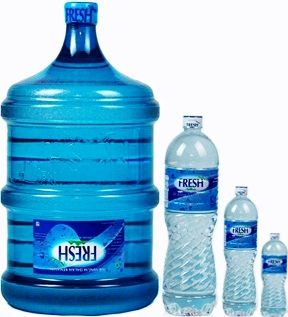Water, which is a special liquid for life, covering two-thirds of the earth's surface. Body of every living creature on earth was formed from this very special liquid with a ratio between 50% - 95%. Of the bacteria that live in hot springs with temperatures approaching the boiling point of water, until some kind of moss that grows on the glacier, there is life in every place where there is water, regardless of temperature. Even at the drop of water hanging on the edge of a leaf after the rain, thousands of live microorganisms emerge, reproduce, and die.
But did you know that it turns out water molecules, which are the basis of life on earth, it is very difficult to form. First of all, let us imagine the molecules of hydrogen and oxygen, which is a component of water, put in a glass container. Next we let both of them are in the container in a very long period of time. In the time during which these gases may not form the water even if they remain in the container for hundreds of years. Even if water is formed, will not be more than a handful in the bottom of the container and that too will happen very slowly, can be up to thousands of years.
Cause why the water very slowly formed in these conditions is the temperature. At room temperature, oxygen and water react very slowly.
In a free state, oxygen and hydrogen found as H2 and O2 molecules. To join to form water molecules, they must collide. As a result of this collision, the bonds that form molecules of hydrogen and oxygen to weaken, so there is no longer a barrier to joining the oxygen and hydrogen atoms. Temperatures will increase energy as well as the speed of these molecules, thus increasing the number of collisions that occur. As a result, the reaction is accelerated. But now, no longer high enough temperature to form water on the earth. The heat required for the formation of water supplied during the formation of the earth, that which gives the appearance that covers a lot of water as much as three-quarters of the earth's surface. Currently, the water evaporates and rises into atomosfir where later he became cold and back to earth as rain. Whereby, the amount of water has not increased, but only experienced a continuous cycle.
The properties of water are amazing
Water has many unique chemical properties. Each molecule of water formed by the combination of hydrogen and oxygen atoms. Quite interesting that both of these gases, one easily burn and other flammable, joined to form a liquid, and more interestingly, the liquid is water.
Now, let's see briefly how the Water is made chemically. Water is zero electric charge, which is electrically neutral. Even so, because the size of oxygen and hydrogen atoms, the oxygen component of water molecules have a slightly negative charge and slightly positively charged hydrogen component. If more than one molecule of water that joins, positive and negative charges will be the attraction to form a very special bond, which is "hydrogen bonding". Katan hydrogen is a very weak bond and has a very short period. The duration of a hydrogen bond is approximately one hundred billion trillionth of a second. But once a bond broken, the other a direct bond is formed. Therefore, water molecules stick together tightly while also retaining the form of liquid because the molecules are united by a weak bond.
Hydrogen bonding also allows the water to resist changes in temperature. Although air temperature increased suddenly, the water temperature increased only slowly, and likewise, if the air temperature dropped suddenly, the water temperature slowly decreases. Large temperature changes required for rapid changes in water temperature. Thermal energy is very high water has huge benefits for life. As a simple example, there are a lot of water in our bodies. If water is to adapt to temperature changes that occur suddenly in the air with the same rate of change, then we will experience a fever or sudden freezes.
Likewise, the water requires a very large thermal energy to evaporate. Because so much thermal energy is used when vaporized, the temperature decreases. As an example, again from the human body, the body's normal temperature is 36 ° C and the highest body temperature that can be tolerated is 42 ° C. 6 ° C difference is certainly very small and even move a few hours in the sun can increase the body temperature of such magnitude. Even so, our bodies spend a lot of thermal energy through sweat, that is, by causing the water they contain evaporates, which in turn causes the body temperature decreases. If your body does not have an automatic mechanism like this, then move in the sun a few hours can be fatal.
Hydrogen bonds also supplement with other remarkable properties, which is more viscous water in liquid form than in the solid state. Actually, almost all substances on earth is more condensed in the solid state than in liquid form. However, unlike other substances, water expands when frozen. This is because the hydrogen bonds prevent the water molecules to bind to each other very tightly, so that many gaps are left between the molecules. Hydrogen bond is lost when water is in liquid form, thus causing more oxygen atoms adjacent to each other and form a structure that is more viscous.
This is also why ice is lighter than water. Generally, if you melt any metals and is inserted into the molten metal plate the same number, then these plates will sink straight to the bottom. However, in the water things happen differently. Iceberg that weighs thousands of tons will float on water like a cork. What benefits provided by these unique properties of water?
Let us answer this question by taking the example of a river: If the weather is very cold, river water will not freeze completely, but only the frozen surface. Being closest to the water reaches the temperature of +4 ° C, and immediately after reaching this temperature, he will sink to the bottom. Ice formed on the surface of the water as a layer. Below this layer, the water continues to flow, and because of +4 ° C is the temperature at which living organisms can survive, then life in the water continues.
Special properties of Water are very interesting
We all know that water boils at 100 ° C and freezes at 0 ° C. But in fact, in normal conditions, the water should boil at a temperature of +180 ° C rather than at a temperature of 100 ° C. Why?
In the periodic table, the properties of the elements contained in the same group element varies progressively from mild to heavy elements. This fact can be seen clearly in compounds of hydrogen. Compounds of elements that a party with oxygen in the periodic table called "hydrides". So the water (H2O) is the "oxygen hydrides". Hydrides of other elements in this class have the same molecular structure as water molecules.
Boiling point of these compounds are different and the increasing of the element sulfur into heavier elements; however, the boiling point of water does not follow this pattern. Water (oxygen hydride) boils at a temperature of 80 ° C lower than they should. Another surprising situation that also occurs in titih frozen water. Again, according to the order of the periodic system, the water should be frozen at a temperature of -100 ° C. However, Water does not meet this rule and freezes at 0 ° C, a temperature of 100 ° C higher than the freezing point should be. This certainly raises questions in our minds as to why not the other hydrides, but only Water (oxygen hydride) that do not meet the rules of this periodic system?
"The Miracle In The Atom" oleh Prof. Adnan Oktar
Ta-Ha Publishers Ltd. I Wynne Road, London SW9 OBB, United Kingdom.



.jpg)


.jpg)
.jpg)
.jpg)
.jpg)
.jpg)
.jpg)
.jpg)

